
EMITTER-International Journal of Engineering Technology
Scope & Guideline
Advancing Engineering Innovation for a Technological Tomorrow
Introduction
Aims and Scopes
- Engineering Innovations:
The journal publishes research on novel engineering methodologies and technologies, including the design, analysis, and implementation of innovative systems. - Applied Technology Research:
Studies often focus on practical applications of technology across various sectors, such as telecommunications, robotics, and renewable energy. - Interdisciplinary Approaches:
Encourages research that combines principles from different engineering disciplines, fostering collaboration and integration of technologies. - Machine Learning and AI Applications:
With a growing emphasis on AI, the journal explores the use of machine learning techniques in engineering problems, including image processing and predictive analytics. - Sensor and IoT Technologies:
Research on the development and application of sensors, IoT devices, and their integration into systems for enhanced monitoring and automation.
Trending and Emerging
- Deep Learning and AI Integration:
There's a marked increase in research utilizing deep learning techniques across various applications, from medical imaging to automated systems, indicating a strong trend toward AI integration in engineering. - 5G and Next-Generation Networks:
Research on 5G technology and its applications is gaining momentum, with studies focusing on network slicing, performance analysis, and machine learning integration. - Environmental and Sustainable Engineering:
An emerging focus on sustainability, particularly in renewable energy systems and smart technology solutions, reflects a growing concern for environmental impact. - Smart IoT Solutions:
The development of smart solutions leveraging IoT technology is increasingly prominent, addressing real-time monitoring and automation challenges. - Health Informatics and Biomedical Engineering:
The rise in studies related to health informatics, particularly in utilizing AI for diagnostics and patient monitoring, showcases the intersection of technology and healthcare.
Declining or Waning
- Traditional Energy Systems:
Research related to traditional energy systems, such as fossil fuels, is being overshadowed by a shift towards renewable energy and sustainability. - Basic Communication Protocols:
Studies focusing solely on basic communication protocols are declining as researchers now prefer exploring advanced networking techniques, especially in the context of 5G and beyond. - Static Data Analysis:
The trend is moving away from static data analysis methods towards dynamic and real-time data processing, particularly in machine learning applications. - Conventional Manufacturing Techniques:
Interest in conventional manufacturing methods is diminishing in favor of advanced manufacturing technologies, such as 3D printing and automation. - Simple Predictive Models:
There is a noticeable decline in the use of simple predictive models, as the focus shifts to more complex, hybrid models that incorporate machine learning.
Similar Journals

PROGRAMMING AND COMPUTER SOFTWARE
Pioneering Research in Programming and Software SolutionsPROGRAMMING AND COMPUTER SOFTWARE is a distinguished journal committed to advancing the field of software development and programming methodologies. Published by PLEIADES PUBLISHING INC, this journal has been a valuable resource since its inception in 1978, reaching out to researchers, professionals, and students alike. With an emphasis on rigorous peer-reviewed articles, the journal holds a Q3 ranking in the realm of Software according to the latest 2023 Category Quartiles. Though it does not offer open access, the journal ensures that high-quality research is disseminated to its audience, providing insights into evolving programming techniques, software engineering challenges, and innovative solutions. With its convergence of years extending to 2024, PROGRAMMING AND COMPUTER SOFTWARE remains a pivotal publication, fostering a deeper understanding of the complexities in computer programming while supporting the broader software community.

Software and Systems Modeling
Transforming Ideas into Systematic SolutionsSoftware and Systems Modeling is a premier journal published by Springer Heidelberg, dedicated to advancing the fields of software engineering, modeling, and systematic design. With an ISSN of 1619-1366 and an E-ISSN of 1619-1374, this journal has established itself as a critical resource for researchers and practitioners alike since its inception in 2005. The journal currently holds a Q1 quartile ranking in the Modeling and Simulation category and a Q2 ranking in Software, reflecting its influential contributions to the field. Its Scopus rankings further underscore its relevance, positioned at #55 in Modeling and Simulation and #139 in Software, with impressive percentiles of 83rd and 65th respectively. Although it does not currently offer open access, it remains an essential platform for disseminating innovative research and fostering dialogue among professionals in Germany and beyond. The journal’s objective is to publish high-quality articles that contribute to the understanding and development of software and systems modeling, ensuring ongoing advancements in this dynamic arena.

Innovations in Systems and Software Engineering
Elevating Standards in Software Engineering ResearchInnovations in Systems and Software Engineering, published by Springer London Ltd, is a highly relevant journal dedicated to advancing the field of software engineering and systems innovation. With an ISSN of 1614-5046 and E-ISSN 1614-5054, this journal serves as a key platform for researchers and practitioners to share their insights, cutting-edge research, and developments from 2005 to 2024. Positioned in the Q3 category for software within the 2023 metrics and ranked #219 out of 407 in Scopus, the journal highlights its commitment to addressing the evolving challenges and opportunities in software systems. Although not open access, it maintains a rigorous peer-review process to ensure the dissemination of quality research. As the field continues to grow in complexity, Innovations in Systems and Software Engineering is vital for fostering collaboration and innovation among professionals, students, and researchers aiming to shape the future of software engineering.
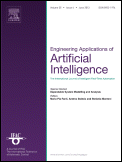
ENGINEERING APPLICATIONS OF ARTIFICIAL INTELLIGENCE
Exploring the Intersection of AI and Engineering ExcellenceENGINEERING APPLICATIONS OF ARTIFICIAL INTELLIGENCE, published by PERGAMON-ELSEVIER SCIENCE LTD, stands as a premier journal within the disciplines of Artificial Intelligence, Control and Systems Engineering, and Electrical and Electronic Engineering. With an impressive Q1 ranking across these categories in 2023 and a strong presence recognized by Scopus rankings, this journal provides a vital platform for disseminating cutting-edge research innovations and applications that harness the power of AI in engineering. Spanning over three decades of scholarly contributions from 1988 to 2024, the journal appeals to a diverse audience including researchers, industry professionals, and students eager to explore the transformative impacts of artificial intelligence on engineering practices. While not an open-access journal, it ensures that significant advancements in the field remain accessible through library subscriptions. By fostering scholarly dialogue and advancing knowledge in engineering applications of AI, this journal plays an integral role in shaping the future of technology and innovation.

Engineering Technology & Applied Science Research
Exploring the Frontiers of Signal Processing and TechnologyEngineering Technology & Applied Science Research is a distinguished open-access journal published by EOS ASSOC based in Greece, focusing on the multifaceted realms of engineering, materials science, and signal processing. Established in 2011, this journal has rapidly gained recognition, achieving a Q2 ranking in Engineering (miscellaneous) and a Q3 ranking in both Materials Science and Signal Processing for 2023, showcasing its growing impact in these critical fields. With an emphasis on disseminating high-quality research and fostering innovation, ETASR provides a platform for researchers, professionals, and students to share their findings and explore emerging technologies. The journal's Scopus rankings further reinforce its significance, positioning it strongly within the top percentiles among its peers. With a commitment to open access, ETASR ensures that research is accessible to a global audience, promoting collaboration and knowledge sharing across disciplines. Whether you are a seasoned researcher or a budding student, ETASR is an invaluable resource for advancing your understanding and contributing to the cutting-edge developments in engineering and applied sciences.
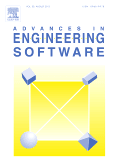
ADVANCES IN ENGINEERING SOFTWARE
Shaping Tomorrow's Engineering with Cutting-Edge Software Insights.ADVANCES IN ENGINEERING SOFTWARE, published by Elsevier Science Ltd, stands at the forefront of interdisciplinary research in the realms of engineering and software development. With an impressive impact factor reflected in its Q1 and Q2 rankings in the Engineering (Miscellaneous) and Software categories, respectively, this journal serves as an essential platform for researchers and practitioners alike to disseminate innovative findings and methodologies from 1982 to the present. Strategically positioned within the United Kingdom, it engages scholars, professionals, and students by publishing high-quality articles that emphasize advancements in software applications related to engineering challenges. Although it does not currently offer open access, the journal remains highly regarded within the academic community, consistently attracting impactful research and maintaining a commendable Scopus ranking within the top tiers of both general engineering and software disciplines. Explore the latest contributions to enhance your knowledge and stay updated on trailblazing developments in engineering software.
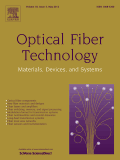
OPTICAL FIBER TECHNOLOGY
Innovating the Future of Light and ConnectivityOPTICAL FIBER TECHNOLOGY is a premier journal in the fields of atomic and molecular physics, optics, control and systems engineering, as well as electrical and electronic engineering, published by ELSEVIER SCIENCE INC. With an ISSN of 1068-5200 and E-ISSN 1095-9912, it offers a platform for disseminating cutting-edge research and developments in optical fiber technology and its applications. The journal has achieved a notable impact, ranking in the second quartile for multiple categories in 2023, including control and systems engineering and electronic, optical, and magnetic materials. By providing a robust avenue for peer-reviewed articles, OPTICAL FIBER TECHNOLOGY caters to a diverse audience of researchers, professionals, and students dedicated to advancing knowledge and innovation in optics and related fields. This respected journal is particularly suited for those seeking to stay updated on the latest technological advancements and research trends, ensuring its relevance in both academic and industrial contexts.
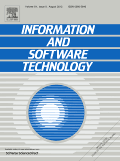
INFORMATION AND SOFTWARE TECHNOLOGY
Shaping the Future of Computer Science Applications and TechnologyINFORMATION AND SOFTWARE TECHNOLOGY, published by Elsevier, is a leading journal that stands at the forefront of the fields of software engineering, information systems, and computer science applications. Since its inception in 1970 and with a focus extending to 2025, this esteemed publication has made significant contributions to the discourse on technological advancements and innovations. In 2023, it has achieved a remarkable Q1 categorization across multiple domains, including Computer Science Applications, Information Systems, and Software, reflecting its excellence and relevance in the academic community. With Scopus rankings that place it in the top percentiles in its categories (85th, 83rd, and 83rd respectively), the journal serves as an essential platform for researchers, professionals, and students eager to disseminate and engage with cutting-edge research and developments. While it does not currently offer Open Access options, the knowledge curated within its pages remains invaluable for advancing the fields of information technology and software development.

Journal of Web Engineering
Advancing the Frontiers of Web TechnologiesThe Journal of Web Engineering, published by RIVER PUBLISHERS, serves as a pivotal platform for researchers, professionals, and students interested in the expanding fields of web technologies and engineering. Since its inception in 2008, this journal has dedicated itself to advancing knowledge and promoting innovative practices in Computer Networks and Communications, Information Systems, and Software Engineering. With an impressive convergence of research up to 2024, its Q3 quartile ranking in both Computer Networks and Communications and Information Systems reflects the journal's commitment to the dissemination of high-quality, impactful research. Although it operates as a traditional access journal, it allows for vital contributions to be shared widely among a diverse readership. The Journal of Web Engineering's rankings in Scopus, including a percentile placement of 28th in Computer Networks and Communications, demonstrate its relevance and growing significance in the academic landscape. As the digital world continuously evolves, this journal remains a crucial resource for exploring the latest advancements and theoretical reflections within the realm of web engineering.
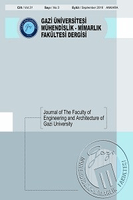
Journal of the Faculty of Engineering and Architecture of Gazi University
Elevating knowledge through open access and impactful research.The Journal of the Faculty of Engineering and Architecture of Gazi University, ISSN 1300-1884, is an esteemed publication aimed at advancing knowledge in the fields of architecture and engineering. Published by GAZI UNIVERSITY, this journal has established itself as a crucial resource for researchers and practitioners alike since its inception in 1998, with its content spanning up to 2024. Noteworthy for its impact, the journal is categorized in Q2 for Architecture and Q3 for miscellaneous engineering fields, reflecting its significant contribution to ongoing discussions and innovations in these areas. With a Scopus rank of #50 out of 189 in Architecture and #168 out of 307 in General Engineering, this journal resonates with a wide audience by showcasing high-quality research that fosters collaboration and inspiration within the academic community. The journal's commitment to open access facilitates the free dissemination of knowledge, making it an essential read for students, professionals, and researchers looking to contribute to the evolving landscape of engineering and architectural practices. Located in Ankara, Turkey, it serves as a pivotal platform for the international exchange of ideas and methodologies in engineering and architecture.